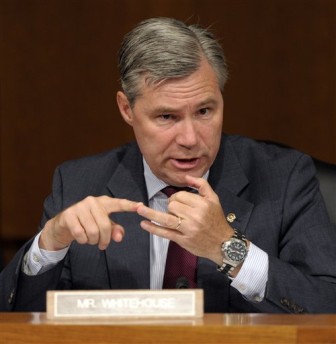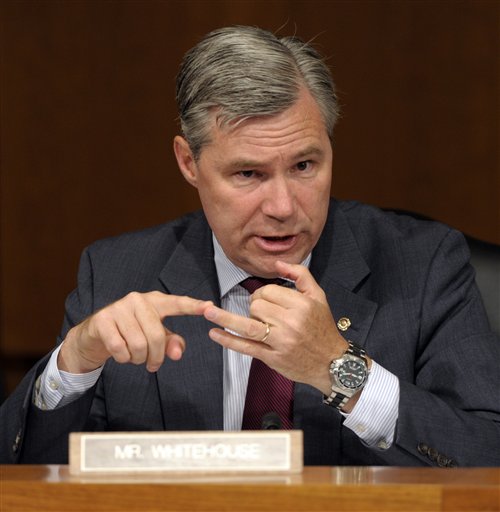
Susan Walsh / AP
U.S. Sen. Sheldon Whitehouse
WASHINGTON — A bipartisan juvenile justice bill introduced today would significantly strengthen requirements meant to protect youths while putting teeth into regulations to prevent widespread waste, abuse, fraud and retaliation against whistleblowers in the U.S. Justice Department.
The bill, introduced by Sens. Charles E. Grassley, R-Iowa, chairman of the Senate Judiciary Committee, and Sen. Sheldon Whitehouse, D-R.I., would also add stricter rules for reducing racial and ethnic disparities in juvenile justice and phase out the detention of “status offenders.” These are children whose offenses — such as truancy or possession of alcohol — are considered crimes only because they are minors.
The provisions come as part of the proposed reauthorization of the federal Juvenile Justice and Delinquency Prevention Act (JJDPA), which lapsed in 2007 and has not undergone a major overhaul in two decades.

Gage Skidmore / Flickr
U.S. Sen. Charles Grassley
“Our bill provides a long-overdue policy refresh to improve opportunities for our nation’s most vulnerable children and strengthen safeguards for youth who encounter the juvenile justice system,” Grassley and Whitehouse said in a joint statement.
“Our bill also creates measures to tackle fraud and waste so that our youth can benefit from the programs’ full potential.”
Whitehouse said the bill would enable kids in the juvenile justice system to “have appropriate opportunities to get back on track rather than being marginalized and falling further behind.”
In the statement, he also said the legislation would ensure protection of juveniles in custody and keep them out of adult prison while reducing racial and ethnic disparities.
Longtime juvenile justice advocates praised the measure.
“It is crucial to reauthorize and update the JJDPA so that it addresses the most pressing issues in juvenile justice today such as reducing racial and ethnic disparities, keeping kids out of adult jails and reducing detention and incarceration of children in the justice system,” said Liz Ryan, president and CEO of the Washington-based Youth First! Initiative, which seeks to reduce incarceration and increase alternatives to it.
The bill would strengthen one of JJDPA’s four core requirements by removing youth charged in adult court from placement in adult jails.
Ryan also noted the bill would shift the emphasis on reducing racial and ethnic disparities from mainly “addressing” them to taking concrete steps to reduce them.
And after an eight-month inquiry into juvenile justice grants, waste, abuse, fraud and accountability, the statement from Grassley and Whitehouse said: “A number of whistleblowers alleged that many states fall short of core requirements to receive the taxpayer-funded grants, and the Justice Department office responsible for overseeing the program has admitted it has had an unlawful policy in place since 1997 that allowed states to receive these grants despite violations of funding requirements.
“This prompted Grassley and Whitehouse to craft new accountability requirements to ensure that taxpayer dollars are being used appropriately, and youth are being adequately served,” the joint statement said.
The bill also incorporates recent research into adolescent behavior and brain research, which has shown the brain can continue developing until the mid-20s and that adolescents are prone to peer pressure, can be reckless and disregard long-term consequences of their behavior. At the same time, however, the research has found almost all children at some point engage in delinquent behavior but most outgrow it and that youths are especially amenable to rehabilitation.
Such research has led to calls for a more rehabilitative approach to juvenile justice that relies more on community-based alternatives and less on incarceration, especially for nonviolent offenders. They comprise about two-thirds of the children in some form of locked “residential placement” at any given time.
Marie Williams, executive director of the nonprofit, Washington-based Coalition for Juvenile Justice, said she was heartened by the measure’s emphasis on such research.
“We now have much more information about adolescent brain development, which tells us that kids are different, and the Supreme Court has weighed in even more definitively on this issue,” Williams said in an email.
“We have more data about the harms of secure detention for most young people, and about the benefits of community-based interventions; and we have lots more information on how specific sub-groups like girls and kids of color fare in the juvenile justice system, and what interventions may work to help them.”
The bill also would:
- Require the federal Office of Juvenile Justice and Delinquency Prevention (OJJDP) to identify “best practices” to serve and protect at-risk youth.
- Place a greater focus on helping juvenile offenders who need mental health and substance abuse treatment.
- Expand training to support judges who work on juvenile cases.
- Improve transparency and accountability in juvenile justice programs.
- Improve re-entry services for those coming out of the juvenile justice system.
- Scrutinize cases of juveniles whose offenses originated on school grounds, during off-campus activities or due to referral by any school official. The Obama administration has made reducing the “school-to-prison” pipeline a priority.
Rep. Tony Cardenas, D-Calif., known for his juvenile justice advocacy, welcomed the bill.
“Reauthorizing this important legislation is long overdue and necessary to strengthen youth protections to reflect the contemporary needs of our most vulnerable children,” Cardenas said in an email.
“I am particularly thrilled to see the bill prohibit the exemption that allowed youth to be detained for ‘status’ offenses — offenses that would not be a crime if committed by an adult — like truancy, smoking or running away from home.”
Marcy Mistrett, CEO for the Washington-based nonprofit Campaign for Youth Justice, said in an email the bill “brings the JJDPA in line with what research tells us and states know — that incarcerating kids, particularly status offenders, and locking kids up with adults causes harm and does not reduce crime and delinquency.
“This bill reaffirms a national commitment to the rehabilitative purpose of the juvenile justice system; one that supports developmentally appropriate practices that treat as many youth as possible in their communities. It is both cost-effective and the morally right thing to do.”
In a statement released by the Justice Department, Assistant Attorney General Karol Mason said: “We are pleased that the Senate has introduced legislation reauthorizing the Juvenile Justice and Delinquency Prevention Act, which will go a long way toward building a fairer and more effective juvenile justice system and ensuring opportunity for all of America’s young people.”
Mason, who leads the Office of Justice Programs, which oversees OJJDP, had come under fire from Grassley in letters in the past eight months and at a Senate Judiciary Committee hearing last week based on findings from his inquiry.
Responding to questioning from Grassley, Mason said at the hearing, “We have been reviewing OJJDP’s compliance monitoring program, which has revealed a number of errors and systemic flaws in the program’s operation.”
Ryan of the Youth First! Initiative said she’s “very hopeful” the bill will pass both houses and be signed by President Obama.
“I think there is a growing consensus that too many youth are locked up, that persistent disparities in the juvenile justice system need to be reduced, and that kids should not be placed in adult facilities,” she said.
